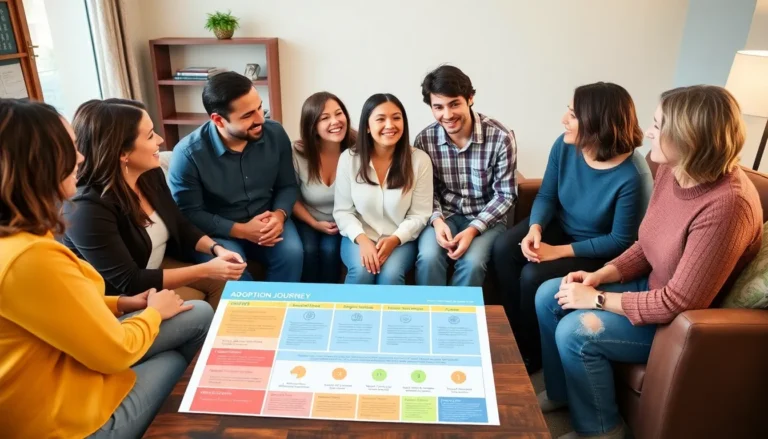Table of Contents
ToggleEvery October, the world gets a little brighter as Special Needs Awareness Month rolls around. This isn’t just a time for awareness; it’s a celebration of uniqueness, resilience, and the incredible contributions individuals with special needs make to our communities. It’s like a party where everyone’s invited, and the only requirement is to bring your best self—quirks and all!
But let’s be honest, spreading awareness isn’t just about sharing heartwarming stories and inspirational quotes. It’s about breaking down barriers, challenging misconceptions, and having a few laughs along the way. So grab your favorite snack and get ready to dive into a month filled with education, empathy, and maybe even some unexpected humor. After all, who says awareness can’t come with a side of fun?
Understanding Special Needs Awareness Month
Special Needs Awareness Month occurs every October, aiming to spotlight the diversity and contributions of individuals with special needs. This month encourages education and empathy in communities.
History of Special Needs Awareness Month
Special Needs Awareness Month originated in the 1980s. Advocates sought to promote understanding and inclusivity for individuals with disabilities. Over time, the month evolved to encompass various events, workshops, and campaigns. In 1986, Congress officially recognized this month, increasing visibility on a national level. Since then, numerous organizations have joined the effort to highlight the importance of acceptance and inclusion.
Importance of Awareness
Awareness is crucial in combatting stereotypes about individuals with special needs. Educating the public fosters empathy and understanding, which can lead to improved accessibility and opportunities. Informed communities become more supportive, creating inclusive environments for everyone. Awareness also encourages individuals to engage in conversations, prompting critical thinking about acceptance. By promoting understanding, society takes steps toward reducing stigma and enhancing the quality of life for those with special needs.
Activities to Promote Awareness
Engaging in activities that promote awareness significantly enhances understanding of individuals with special needs. Various formats exist for communities and organizations to participate.
Community Events
Community events create opportunities for local residents to come together. Activities like awareness walks, fairs, and festivals educate the public while celebrating diversity. Local businesses can sponsor events to provide resources for families and individuals. Collaborating with advocacy groups helps ensure inclusivity, allowing everyone to join. Events also feature guest speakers and workshops that address common misconceptions about disabilities.
Educational Programs
Educational programs play a vital role in promoting understanding. Schools can implement curriculum changes to incorporate lessons about special needs. Workshops for parents and educators increase awareness and teach effective communication strategies. Additionally, online courses can reach a broader audience, promoting inclusivity worldwide. Partnering with organizations that specialize in disability advocacy enhances program effectiveness, ensuring accurate information is disseminated. These initiatives cultivate empathy and challenge stereotypes, fostering a more inclusive culture.
Impact on Society
Special Needs Awareness Month influences societal attitudes and actions significantly. It prompts a shift in perceptions regarding individuals with special needs.
Changing Perceptions
Raising awareness changes how society views disability. Individuals begin to see the abilities, strengths, and contributions of those with special needs. Media campaigns and community events play a crucial role in showcasing their talents. Increased exposure through social media fosters understanding and compassion. Engaging storytelling challenges misconceptions, inviting empathy. Educational initiatives further encourage open dialogue, leading to acceptance and inclusion.
Supporting Individuals and Families
Supporting families of individuals with special needs creates a stronger community. Resources such as workshops, counseling, and support groups provide essential information and encouragement. Advocacy organizations offer guidance, helping families navigate educational systems and access services. These resources encourage empowerment and understanding within families. When communities rally together, they foster a supportive environment that reinforces the importance of inclusivity. Strengthening support networks leads to improved quality of life for all involved.
How to Get Involved
Getting involved during Special Needs Awareness Month encourages community engagement and promotes understanding. Participating in various initiatives enhances the visibility and support for individuals with special needs.
Volunteer Opportunities
Volunteering offers a direct way to contribute. Local organizations and advocacy groups often seek volunteers for events, workshops, or educational programs. Whether it’s helping with awareness walks, organizing festivals, or assisting at support groups, opportunities abound. Individuals can also explore online platforms where they can find remote volunteering positions. Joining these efforts cultivates friendships and expands networks with like-minded individuals passionate about inclusivity.
Advocacy Efforts
Advocacy remains crucial for driving change. Connecting with local advocacy groups creates a pathway for influencing policy and raising awareness. Engaging in campaigns that highlight the unique abilities of individuals with special needs fosters a culture of acceptance. Public speaking at schools or community events can share personal stories that challenge stereotypes. Additionally, using social media platforms allows individuals to amplify their voices and reach broader audiences. Embracing advocacy contributes to a society that values inclusion and understanding.
Conclusion
Special Needs Awareness Month serves as a vital reminder of the importance of inclusivity and understanding. Engaging with this month allows individuals and communities to challenge stereotypes and foster empathy. By participating in events and spreading awareness, everyone can contribute to a culture that values the unique abilities of individuals with special needs.
As society continues to evolve, the lessons learned during this month can have a lasting impact. Supporting local initiatives and advocating for change not only enhances the lives of those with disabilities but also enriches the community as a whole. Embracing this journey together can lead to a more compassionate and inclusive world for all.







